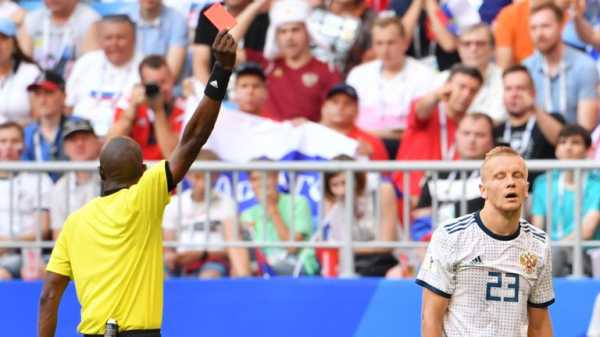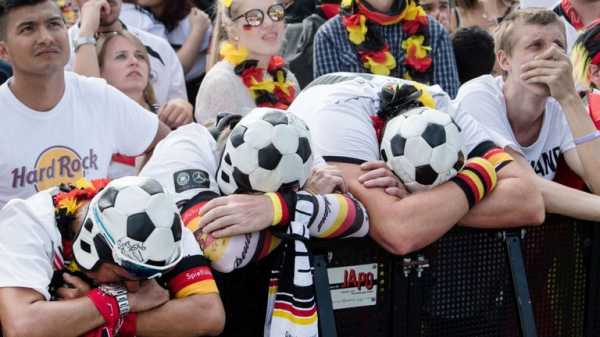
France were crowned champions with a 4-2 win over Croatia, but what were the key trends of the World Cup?
The six-goal final provided a fitting finale to an action-packed tournament as VAR came to the fore again. Here, we pick out six trends.
VAR, Mbappe, Lloris: Story of the final
Nev: Penalty cloud but best side won
VAR takes centre stage
The introduction of VAR was always going to be a key talking point at this World Cup and from the group stage to the final, it has certainly added to the drama and controversy. The delays have frustrated some and the decisions have baffled others – with the penalty call against Croatia leading some to conclude that the system has disappointed.

However, VAR cannot remove human error. When decisions are thought to have been wrong this has been despite the referee having the benefit of the VAR not because of it. Ultimately, the technology has helped to overturn numerous calls that were initially incorrect and therefore led to fairer outcomes than would otherwise have been the case.
South Korea’s significant winner against Germany was wrongly disallowed for offside before VAR revealed the error. Colombia’s Davinson Sanchez was incorrectly adjudged to have conceded a penalty against Senegal that could have eliminated them had the decision not been reversed. For all the fun and games, VAR has led to fewer errors at this World Cup.
World Cup 2018
| Goals scored | 169 |
|---|---|
| Yellow cards | 219 |
| Red cards | 4 |
| Penalties taken | 29 |
Penalties galore
One of the features of the tournament has been the number of penalties awarded. Antoine Griezmann’s controversial spot-kick against Croatia was the 29th awarded. It is far more than in any previous tournament.

Only 13 penalties were given at the 2014 World Cup in Brazil with 15 awarded in 2010. Seventeen – all scored – were given in 1998, while the previous record was the tally of 18 from 2002. One of the chief reasons for the increase this time around is surely VAR – with a large proportion of penalties coming after VAR reviews.
The set-piece World Cup
Penalties were not the only set-pieces to dominate the World Cup. In total, 73 of the 169 goals scored came from dead ball situations – an extraordinary total of 43 per cent.
It was more than in any previous edition of the World Cup and no side typified it quite like England. Gareth Southgate’s side scored nine goals from set pieces on their route to the semi-finals, beating a record previously held by Portugal in 1966.
Red cards down
While the chance to take a second look at decisions has increased the number of penalties, red cards are trending in the opposite direction as the number of players who have been sent off at this World Cup has decreased. Over the course of the tournament in Russia, only four players received a red card – Carlos Sanchez, Jerome Boateng, Igor Smolnikov and Michael Lang.

That is the fewest number of red cards at a World Cup since 1978, when only three players were sent off, and it is a significant decrease on recent totals. In 2014, 10 players received their marching orders, in 2010, it was 17, and in 2006, it was 28
There were some examples of leniency in Russia too. In the group stage, Gerard Pique got away with a two-footed challenge against Morocco, while Cristiano Ronaldo was fortunate to escape a red card for a swing of the arm against Iran on the same evening, while England fans wondered why Dejan Lovren was not carded during their semi-final with Croatia. It seems that VAR has had an impact.
Tight games, late goals
The number of goals scored in Russia (169) is two down on the last World Cup, but there was still plenty of late drama and entertainment. After all, it is better to watch a game with all outcomes still in play as the contest reaches its climax – particularly when there was only one nil-nil draw due to so many late twists.

There were no fewer than 13 result-changing goals in the 90th minute or later (excluding extra-time) – nine winners and four equalisers. Eleven of them happened in the group stage, with two more coming in the knockout stages – Nacer Chadli’s winner against Japan in the last 16 and Yerry Mina’s equaliser for Colombia against England.
Familiar continental dominance
One of those late winners came for already eliminated South Korea against Germany – but while the gap between the best and the rest is closing, the defending champions were an anomaly when it came to the traditional powers. Every one of the other seven countries to have already have won the World Cup succeeded in advancing to the knockout stages.

It became a European affair once Uruguay and Brazil were eliminated in the quarter-finals, and while Croatia were a game away from providing a new winner, France ensured they did not.
Overall, 10 of the 14 European entrants progressed to the last 16. Four of the five South American sides also went through, while Mexico were the only CONCACAF team to make the knockout rounds. The most disappointing federation was Africa – not one of their five representatives survived the group stage with Senegal losing out to Japan in Group H.
Comment below to get involved in the debate, but please adhere to our House Rules. If you wish to report any comment, simply click on the down arrow next to the offending comment and click ‘Report’.
Also See:
Sourse: skysports.com






